
In 1994, when I was twelve, I purchased a copy of Jeff Buckley’s Grace from a CD shop in Chattanooga, Tennessee. At that point, I had no idea who he was; but, I had a tendency to run into music stores, grab records that were foreign to me, and then give them a spin. It was always a hit or miss endeavor. Maybe a minute into “Mojo Pin”, the first album on the track, I knew I had discovered something special. I became obsessed with that album, with Buckley’s voice, and – as a young homosexual – his staggering beauty. Something about him always felt too big for this world, as if he was a visitor from another world, brought here to make us all a little bit better, before he had to return to his home planet. When he died in 1997 from a tragic accidental drowning in Memphis, I was crushed. The idea that I would never get to hear another fully realized album from Buckley was unfathomable. In fact, it still is.

Now, 28-years after his passing, filmmaker Amy Berg has brought us It’s Never Over, Jeff Buckley, the first feature-length documentary about the singer, and a painful chronicle of the life of a person who brought so much joy to so many, but struggled to find enough for himself. Berg utilizes visual flourishes that call to mind Montage of Heck and Moonage Daydream, but it’s an otherwise fairly straight-forward piece that follows Buckley, chronologically, from being the son of folk legend, Tim Buckley, and reckoning with what that meant; to his rapid ascension as the most unique voice of his generation; to his rapid descent into mental health challenges. We are guided through this journey by those who knew him best: his mother, his long-time girlfriends, his bandmates, and lives he touched during his far too short 30-years on this planet.
There is so much about Jeff Buckley that has been misunderstood over the years, mostly surrounding his death. But It’s Never Over, Jeff Buckley is, thankfully, far more concerned with his life, and celebrating the impact he had on so many. There’s not really a bad word spoken about Buckley in this film. Normally that might feel a bit safe or uninspired, but you really get the sense that, for all his faults, he was a fundamentally loving and compassionate person. You also get a very real sense of just how young Buckley was, still finding his way. Listening to his friends remember how excited he would get meeting his musical heroes (and getting to see photographs that confirm it), you understand Buckley on a very personal level here. Yes, he had a voice unlike any other. Yes, he could craft the most delicate arrangements. But, at the end of the day, he was a kid who loved music and wanted to do his best to make his own.

Though there are numerous talking heads in the film, it really comes alive through the grainy and lo-fi video and audio recordings that pepper the picture, much of which has never before been seen, thanks to the unprecedented access Berg was given by his friends and family. Buckley’s voice can be heard through much of the film, his serving as a sort of haunting and haunted narrator predicting his own demise and eulogizing it at the same time. Buckley knew his time was short. We don’t know how, but he did. And, though I doubt he was ready to leave when he stepped into the waters of the Wolf Harbor River, I also doubt he was surprised when it happened. Again, there was something magical and spritely about Buckley, so it almost feels as if he never died, but transformed into an energy that infected all of the musicians who came after and considered him their greatest influence, of which there are many.
What did Jeff Buckley leave me? One perfect album, and so many personal moments connected to the songs on that album. I remember playing it, in its entirety, to my first boyfriend, on the dock at the summer camp where we were counselors; and I remember us getting to “Corpus Christi Carol” and his bursting into tears. I remember jamming “Grace” with my windows rolled down in my very first car, a maroon 1987 Dodge Daytona, that had one of those blood pressure pump things to adjust the seat levels. And, I remember listening to “Last Goodbye” the night one of my best friends in high school died in a car accident. It was the one song of Buckley’s he had learned on his guitar, and I listened to it over and over again, on repeat, hoping it might help me make sense of everything. Spoiler: It did.

At his best, Buckley was someone who could translate raw emotion and limitless beauty into the poetry he concocted from all the love and trauma of his life. At his worst, he was a sweet and talented young guy who was doing the best he could with the cards he’d been dealt. For me, and for so many others, he was a friend, whether we knew him or not. Amy Berg’s miraculous documentary reminds us of who he was, and introduces a whole new generation to his power, his fragility, and his struggle. Even if I wish Berg had taken more formal risks with the storytelling here, the story itself is worth its weight in gold. For those of us who have waited 28-years for a film about one of our musical heroes, this picture means a lot. I couldn’t be happier it exists, and couldn’t be more devastated that it confirms what we’ve all known for all those years – Jeff Buckley is not coming back. Not physically. But he’s around. Just listen. Hallelujah!
Rating: ****/***** (opening August 8th in limited release via Magnolia Pictures)




